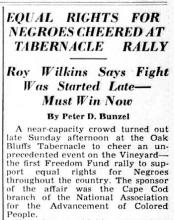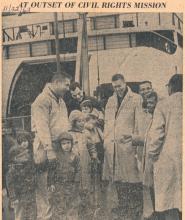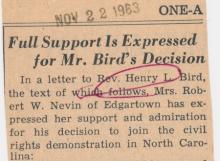Dr. Robert W. Nevin is on his way this morning to Williamston, N. C., as a participant in the civil rights demonstration in which, last week, the Rev. Henry L. Bird, rector of the Episcopal Parish on Martha’s Vineyard, was arrested and jailed in that southern town. His departure from Boston by automobile, with four others, may have been seen on television by Islanders who have long been his patients, his friends, and his admirers.
A succession of groups of five persons is being dispatched from Boston for Williamston, and Dr. Nevin’s contingent is one of the series. He left the Island late yesterday afternoon after having made arrangements through Rev. Bryan Kelley of the Episcopal Church and the Boston headquarters of the N.A.A.C.P. where his group assembled for departure. Once they were under way, their course led directly to Williamston where arrangements had been made for billeting the group.
Identified Himself with Protest
Dr. Nevin said before he left the Vineyard that this was to be for him a symbolic journey, undertaken as a country doctor, a Vineyarder by birth and tradition, a born and bred Republican and conservative, because he rejects and resents the fact that men, women and children are denied the rights to which as human beings and as Americans they are entitled. He intended his journey to identify him completely with the protest in which Mr. Bird is taking part, and with the cause of civil rights and human rights.
He believed that because of his background of characteristic New England conservatism and a heritage of typical old time prejudices his trip will establish that the civil rights demonstration is not a gesture of extremists and impractical idealists.
There can be no doubt that Dr. Nevin’s departure will place the issue in new light and require a broader judgment by the community, although a number of letters in support of Mr. Bird have already been received by the Gazette, including a statement signed by most of the senior class of the Regional High School.
Dr. Nevin was born in Edgartown, the son of Mrs. William S. Nevin and the late Mr. Nevin, and was graduated from the Edgartown High School in 1932. He took his B.S. degree at the University of Vermont and was graduated from the College of Medicine at that University. After completing two and a half years of internship in Massachusetts and Pennsylvania he served for a time as an industrial physician at the Philadelphia Navy Yard and at the Hingham shipyard of the Bethlehem Steel Co.
He began the practice of medicine on the Vineyard in 1943. He is president of the medical staff of the Martha’s Vineyard Hospital and in his professional career has won recognition from leading hospitals and specialists. On the Island he follows the medical tradition of his uncle, the late Dr. Clement C. Nevin, and of his great-grandfather, Dr. Clement F. Shiverick, who built the large house shaded by elm trees which for many years was the office of the Nevin doctors.
Another great-grandfather was Rev. E. H. Nevin, a president of Franklin College in Ohio.
Mr. Bird said last night on the telephone that he was pleased that Dr. Nevin was going down. Yesterday, he said, one of the Negro demonstrators had a heart attack, and the Vineyard minister was appalled, when he visited the man in the hospital, to find that all the Negro patients were being cared for in the basement of the building. He said he thought it would be a good thing for a doctor to see just what the conditions are.

Editorial: Journey
Participation of Dr. Robert W. Nevin in a civil rights journey to Williamston, N. C., as part of the protest in which the Rev. Henry L. Bird enlisted himself last week, challenges the thoughtfulness and good will of the Island community. Here is a commitment by one of the Vineyard’s most prominent and useful citizens, a Republican and conservative by upbringing, as he himself has said, and as far as it is possible to be from the extreme, the radical, and the impractical.
It is a commitment that brings Islanders face to face not only with the question of how they feel about human rights and civil rights, but how they feel about the decision of Mr. Bird to go to Williamston and see his purpose through. The question is posed here and now - who is with this cause and who is against it? The issue is inescapably broadened from the concern of a church or a congregation to the concern of all. The Vineyard as well as Williamston is a place of decision.
Dr. Nevin resents and rejects the segregation and disenfranchisement of human beings and Americans. He identifies himself with those who make sacrifices and take risks as a matter of faith and conviction. Because of what he is doing as a country doctor and layman, indifference, vagueness, and indecision become impossible in the community through which his career has been inextricably woven.
An editorial in the New Bedford newspaper the other day began, in the smart idiom affected by some journalists: “it is difficult to activate the tear glands over the plight of fifteen northern ministers who are currently languishing in the pokey at Williamston, N. C., after arrest in an anti-segregation demonstration.”
Plight? Who said anything about a plight? The jailing of these ministers is part of the business they undertook, and the last thing they are interested in is sympathy for themselves.
The New Bedford editorial proceeds to cite the existence of local ordinances against public gatherings, but it does not cite the constitutional “right” of the people peaceably to assemble,” a right firmly embodied in the system of government under which all of us, as free Americans, are living.
New Bedford should be reminded of its role in helping escaped slaves long ago, all in violation of the letter of the law; it should be reminded of the writings of Henry Thoreau, who was a distinguished visitor to that city, and of the sermons of Rev. Jonathan Mayhew, whose birthplace was Chilmark on Martha’s Vineyard.
As appropriate to this occasion, we quote a few sentences from the writings of Thoreau:
“It is not desirable to cultivate a respect for the law, as much as for the right...”
“He who gives himself entirely to his fellow-men appears to them useless and selfish: but he who gives himself partially to them is pronounced a benefactor and a philanthropist.”
“What is the price-current of an honest man and patriot today? They hesitate, and they regret, and sometimes they petition; but they do nothing in earnest and with effect. They will wait, well disposed, for others to remedy the evil, that they may no longer have it to regret.”
“Oh for a man who is a man and, as my neighbor says, has a bone in his back which you cannot pass your hand through!”










Comments